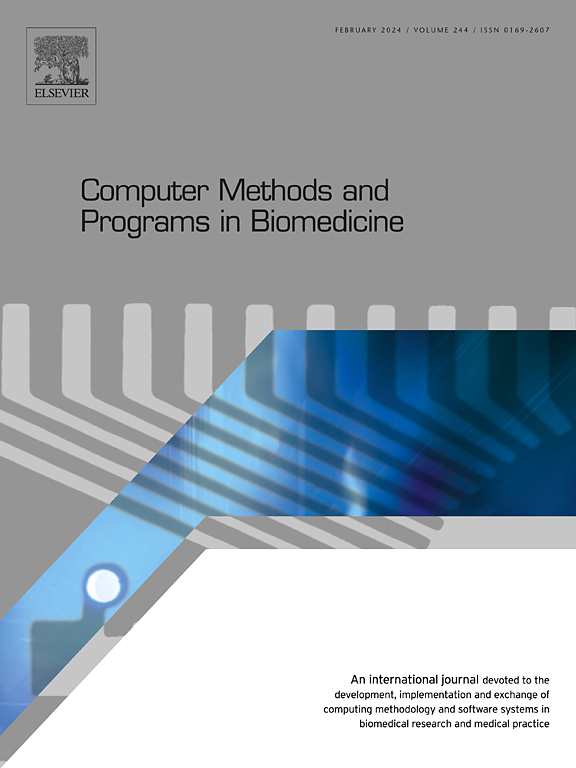A computationally efficient anisotropic electrophysiological multiscale uterus model: From cell to organ and myometrium to abdominal surface
IF 4.8
2区 医学
Q1 COMPUTER SCIENCE, INTERDISCIPLINARY APPLICATIONS
引用次数: 0
Abstract
Background and objective
Preterm labor is a global problem affecting the health of newborns. Despite numerous studies reporting electrophysiological changes throughout pregnancy, the underlying mechanism that triggers labor remains unclear. Electrophysiological modeling can provide additional information to better understand the physiological transition from pregnancy to labor. Previous uterine electrophysiological models do not consider either the tissue thickness or fiber structure, which have both been shown to significantly impact propagation patterns.
Methods
This paper presents a parallel computational model of the uterus using the bioengineering modeling environment OpenCMISS. This model is a multiscale anisotropic model that spans different levels from cell to organ. At the cellular level, the model utilizes a mathematical representation of uterine myocytes based on multiple ion channels. In the 3D uterine model, fiber structures are added, ranging from horizontal rings in the inner layer to vertically downward fibers in the outer layer, to more accurately depict the electrophysiological activities of the uterus. Additionally, we have developed a multilayer volume conduction model based on the boundary element method to describe the propagation of electrical signals from the myometrium to the abdominal surface.
Results
Our model can not only reproduce faithfully both local non-propagated and global propagated electrical activity, but also simulate the fast wave low and fast wave high components of the electrohysterogram (EHG) on the abdominal surface. The model results support the hypothesis that the fast wave high of the EHG signal is related to uterine excitability and fast wave low is related to signal propagation. The amplitude of the simulated signal on the abdominal surface falls in the ranges of real EHG data, which is inversely proportional to the abdominal subcutaneous fat thickness, and the signal waveform highly depends on electrode position and the relative distance to the pacemaker. In addition, the propagation velocity is highly dependent on the uterus geometry and falls in the real-world data range
Conclusions
Our models facilitate a better understanding of the electrophysiological changes of the uterus during pregnancy and labor, and allow for an investigation of drug effects and/or structural or anatomical abnormalities.
计算效率高的各向异性电生理多尺度子宫模型:从细胞到器官,从子宫肌层到腹腔表面。
背景和目的:早产是一个影响新生儿健康的全球性问题。尽管有大量研究报告了整个孕期的电生理变化,但引发分娩的潜在机制仍不清楚。电生理建模可提供更多信息,以便更好地了解从妊娠到分娩的生理过渡。以往的子宫电生理模型没有考虑组织厚度或纤维结构,而这两者已被证明对传播模式有显著影响:本文利用生物工程建模环境 OpenCMISS 提出了一个子宫并行计算模型。该模型是一个从细胞到器官的多尺度各向异性模型。在细胞层面,该模型利用基于多个离子通道的子宫肌细胞数学表示法。在三维子宫模型中,增加了纤维结构,从内层的水平环到外层垂直向下的纤维,以更准确地描述子宫的电生理活动。此外,我们还开发了基于边界元法的多层体积传导模型,以描述电信号从子宫肌层向腹腔表面的传播:结果:我们的模型不仅能忠实再现局部非传播和全局传播的电活动,还能模拟腹腔表面的宫体电图(EHG)的快波低分量和快波高分量。模型结果支持这样的假设,即 EHG 信号的快波高分量与子宫兴奋性有关,而快波低分量与信号传播有关。模拟信号在腹部表面的振幅在真实 EHG 数据的范围内,与腹部皮下脂肪厚度成反比,信号波形高度依赖于电极位置和与起搏器的相对距离。此外,传播速度与子宫的几何形状有很大关系,并在实际数据范围内:我们的模型有助于更好地理解妊娠和分娩期间子宫的电生理变化,并可用于研究药物效应和/或结构或解剖异常。
本文章由计算机程序翻译,如有差异,请以英文原文为准。
求助全文
约1分钟内获得全文
求助全文
来源期刊

Computer methods and programs in biomedicine
工程技术-工程:生物医学
CiteScore
12.30
自引率
6.60%
发文量
601
审稿时长
135 days
期刊介绍:
To encourage the development of formal computing methods, and their application in biomedical research and medical practice, by illustration of fundamental principles in biomedical informatics research; to stimulate basic research into application software design; to report the state of research of biomedical information processing projects; to report new computer methodologies applied in biomedical areas; the eventual distribution of demonstrable software to avoid duplication of effort; to provide a forum for discussion and improvement of existing software; to optimize contact between national organizations and regional user groups by promoting an international exchange of information on formal methods, standards and software in biomedicine.
Computer Methods and Programs in Biomedicine covers computing methodology and software systems derived from computing science for implementation in all aspects of biomedical research and medical practice. It is designed to serve: biochemists; biologists; geneticists; immunologists; neuroscientists; pharmacologists; toxicologists; clinicians; epidemiologists; psychiatrists; psychologists; cardiologists; chemists; (radio)physicists; computer scientists; programmers and systems analysts; biomedical, clinical, electrical and other engineers; teachers of medical informatics and users of educational software.
 求助内容:
求助内容: 应助结果提醒方式:
应助结果提醒方式:


